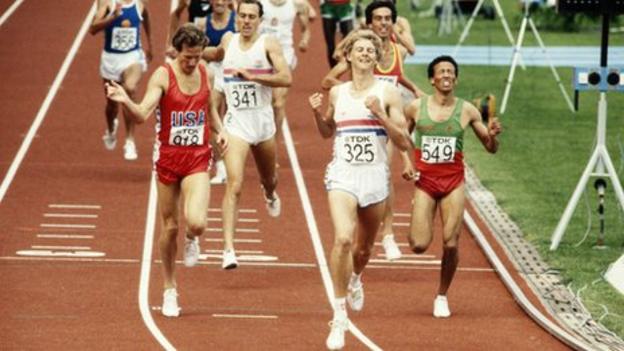Said Aouita fails by a wide margin to crack Coe’s Mile WR whilst being chased home by 32 year old John Walker, breaking 3:50 for the mile again 9 years after becoming the first in history to do it :
No European racing season can be complete without world-record attempts in the middle distances, of course, and the Zurich meet had three of them—all unnecessary failures. In the first, Olympic 5,000 champion Said Aouita of Morocco missed Sebastian Coe’s mile mark by more than two seconds with a 3:49.54, a time that was nonetheless the fastest of the year. Coe, Britain’s two-time Olympic 1,500 gold medalist, then fell nearly two seconds short of countryman Steve Ovett’s 1,500 record with a time of 3:32.39. Finally, Brazil’s Joaquim Cruz, the Olympic champion in the 800, turned in the third-fastest 800 in history: a 1:42.34, just .61 off another of Coe’s world marks.
While each race was exciting, each was also notably flawed. The problem with the mile was that it shouldn’t have been run. It had been hastily added to the program at the last minute to accommodate Aouita, who really wanted to run the 1,500 but was refusing to cooperate with Coe’s record attempt in that race. “It seems to me we can’t have this,” griped Coe. “There are few occasions when you can actually go out and try for a world record.” Said Aouita, “If I’d beaten Coe I would’ve gotten the world record. I go into the race with a better time this year [3:31.54] and he wants me to help him.”
Aouita (pronounced OW-ee-ta) is one of the three men’s middle-distance runners—Cruz and Britain’s Steve Cram being the others—who’ll be heard from most in the next five to 10 years. The range of his talent is astonishing. A former national junior-team soccer player from Fez, he has run the 100 in 11.1, the 800 in 1:44.38 and the 5,000 in 13:04.78. Aouita is a late bloomer at 23 while Coe, by comparison, seems to have been around forever but is merely 27.
Both suffered from inadequate performances by their rabbits in Zurich. Australia’s Mike Hillardt lagged on the third lap of the mile, while U.S. veteran James Robinson did likewise on the second lap of the 1,500.
“Sometimes it comes off, and sometimes it doesn’t,” said Coe with a shrug. But there was a sense of what had been lost. Cruz, a junior at the University of Oregon, saw his chance at a record evaporate when pacer Omar Kalifa of the Sudan tired and didn’t get out of his way on the backstretch of the last lap. “I moved out to pass, but he moved out, too,” said Cruz later. “I had to move back in to get by. It cost me at least half a second.” And so, on a slightly down note, ended the Zurich meet.
But the excitement first sparked by Ashford carried over. In Brussels two nights later, Cruz had a 1:42.41 in the 800 and pulled runner-up Johnny Gray to an American-record 1:43.28. French steeplechaser Joseph Mahmoud approached Henry Rono’s 1978 world record of 8:05.4 with an 8:07.62, and Aouita, despite being unable to keep track of his pace because of malfunctioning stadium clocks, came within 1.20 seconds of Rono’s world 3,000 mark with a 7:33.30. Building was the hunger that could lead to a fascinating 1985. “Next year I want world records,” vowed Aouita. “Next year I shall try for all of them.”
Cruz was left with the same eagerness after a 1:41.77—just .04 off Coe’s world 800 record—in Cologne. All week long he’d been unable to sleep thinking about the record attempt. On Saturday night, however, Cruz decided to make Cologne his final race of the year, and that brought relief from the tension. He cruised through 400 meters behind rabbit Thomas Giessing of West Germany in 49.5—.2 faster than Coe’s record pace—before relaxing too much on his second lap. “I was spacy out there,” Cruz said afterward. “I was too lazy.” Still, he’d carried Kenya’s Sammy Koskei to a 1:42.28 and Gray to a repeat of his U.S. record. Cruz wasn’t crushed. “I have to go under 1:41 next year,” he said. “I have something to work for and something to look forward to.”



